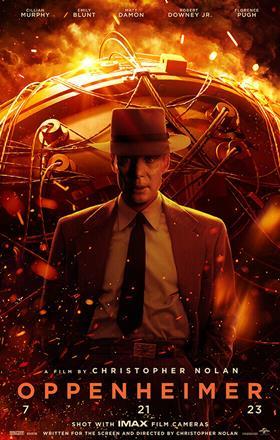Christopher Nolan creates a historical drama, political thriller and powerful life story that surpasses all his previous work.
I am not a Nolan fan. That’s a controversial opinion. Eight of his films, including the just-released Oppenheimer, are in the IMDB top 250, and that’s more than any other director. They are undeniably popular, and that has contributed to my seeing his entire oeuvre since Memento, mostly in the cinema. But they have never been my personal favourites.
Don’t get me wrong, Nolan’s films are usually beautiful, technically near-perfect and always provide material for pub table discussions. But they never really drew me into the emotional journey of their characters. Rather, they are explanatory, thought-provoking films that seem clever on the surface but ultimately tell simple stories that everyone can understand. Mass entertainment with an intellectual gloss.
Then came Oppenheimer. The film outlines J. Roberts Oppenheimer’s early career as a theoretical physicist up to and including the Manhattan Project, and looks back from a post-war perspective in which his ties to communism jeopardise his security status. From a distance, it looks like a classic Nolan: an achronological narrative structure, gorgeous cinematography and fast-paced dialogue in a high-stakes scenario.
Perhaps it is because he finally tells a realistic story, or because he wrote the script in the first person, but Oppenheimer succeeded in pulling me in. The man who gave mankind the power to destroy itself. The chaos in his head is palpable, the hearings are suffocating, and the implications of his work still resonate. The film builds steadily to the Trinity test, intercutting this with scenes in the future. The film is three hours long, but it never drags. Oppenheimer is an ideal protagonist, also thanks to Cillian Murphy’s fantastic performance. Funny and charming, but tormented and imperfect.
All the characters are deeply human. Oppenheimer and his wife are competent scientists and strategists, but lousy parents. Lewis Strauss, the antagonist here, is jealous, petty and vindictive. I don’t know if I got to know their historical counterparts better by watching this film, but it doesn’t matter for the experience. They live and breathe and react believably to the extreme consequences of their actions.
The film takes a decidedly American perspective. The subsequent attacks on Hiroshima and Nagasaki are only mentioned, never shown, which makes a lot of sense. Oppenheimer was no longer involved. As soon as he completed his creation, he lost it. We cannot control the things we create, ever. We have to trust that those who come after us will make the right choices. And if you really don’t want an invention to succeed, don’t build it. Oppenheimer eventually realised this, but unfortunately it was too late. He was a fierce opponent of the development of the hydrogen bomb. Perhaps we should learn from this to put the brakes on sooner in a similar situation.

Oppenheimer
Christopher Nolan
Met o.a. Cillian Murphy, Emily Blunt, Robert Downey, Jr., Matt Damon

















Nog geen opmerkingen